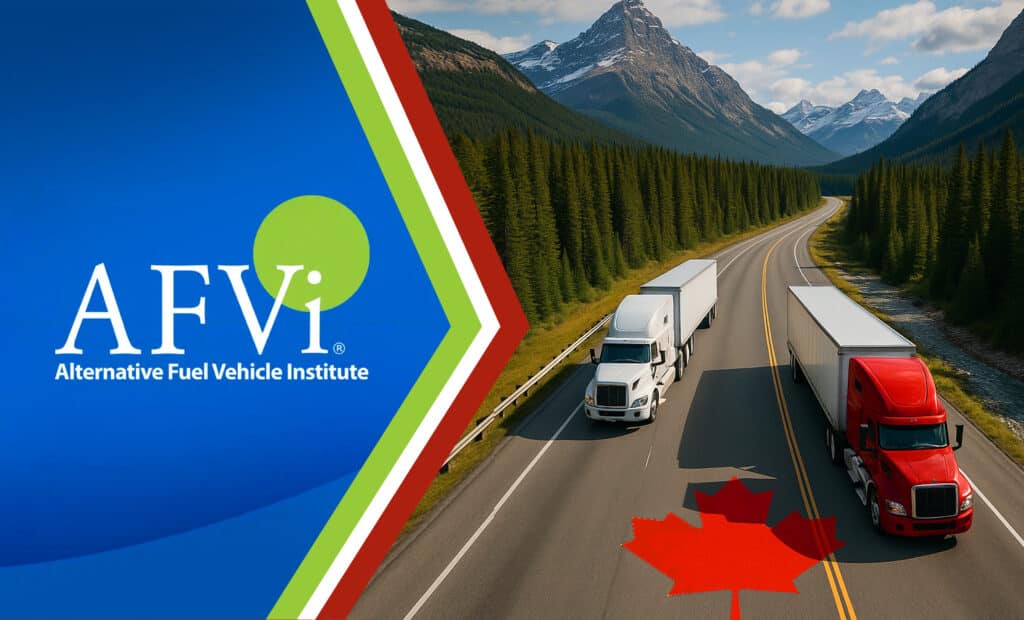A Binational Approach to CNG Vehicle Safety and Compliance
Compressed natural gas (CNG) vehicles are expanding across North America as fleets seek cleaner, more affordable fuel options. But with that growth comes the responsibility of keeping vehicles safe and properly maintained — especially across national borders.
For improved fleet maintenance throughout North America, AFVi has launched a new training program, CNG 201-C: U.S. & Canada – CNG Fuel System Inspector Training. This course is designed for technicians, fleet managers, and inspectors who work on and around natural gas vehicles used in the United States, Canada, or both countries.
It provides comprehensive guidance on all relevant U.S. codes and standards — including NFPA 52 and ANSI NGV 6.1 — alongside Canadian regulations under CSA B109. This means participants will be fully equipped to conduct safe and compliant fuel system inspections no matter where a vehicle was manufactured or operates.
Why a Binational CNG Inspection Course Matters
As NGVs continue to gain popularity throughout North American commerce, cross-border operations require that they meet binational codes. From refuse trucks and transit buses to delivery vehicles and municipal fleets, many organizations now maintain or service CNG vehicles that were built in one country and deployed in another.
- In the United States, technicians typically follow NFPA 52: Vehicular Natural Gas Fuel Systems Code, and ANSI NGV 6.1: Compressed natural gas (CNG) fuel storage and delivery systems for road vehicles.
- In Canada, inspections must meet the requirements of CSA B109: Compressed natural gas vehicle installation code.
To ensure compliance in both jurisdictions, AFVi’s new course bridges these standards, giving inspectors confidence to evaluate vehicles that cross the U.S.-Canada border, or fleets that source vehicles internationally.
How CSA B109 Aligns With U.S. Codes
One of the biggest takeaways from this new training is that CSA B109 closely aligns with both NFPA 52 and ANSI NGV 6.1. In developing our new course, we conducted a thorough comparison of all three codes and found minimal variations. For most components and inspection processes, what applies in the U.S. also applies in Canada.
However, there are still key areas that differ with regard to legal compliance and system safety. That’s why AFVi’s course provides clear explanations so that technicians don’t get caught off guard.
What Our Training Covers
Our U.S. & Canada – CNG Fuel System Inspector Training includes detailed instructions on all applicable codes and standards, as well as highlights the important differences that inspectors need to know.
1. Fuel Line Break Protection
While both U.S. and Canadian standards require measures to prevent gas release from broken fuel lines, CSA B109 has additional language regarding fuel line routing and the use of excess flow valves. AFVi’s course teaches inspectors how to identify compliant fuel line protection under both standards.
2. Automatic Shutoff Valves
AFVi outlines how U.S. standards like NFPA 52 require automatic shutoff valves near the storage cylinders, while CSA B109 provides specific guidance on valve location and accessibility. The course demonstrates inspection techniques that satisfy both codes.
3. Pressure Relief Devices (PRDs)
Our course clarifies the differences between integrated PRDs, manually activated PRDs, and other pressure relief strategies. While these are allowed under both codes, CSA B109 includes detailed installation requirements that go beyond the language in NFPA 52.
4. Fuel System Isolation Components
Isolation valves, check valves, and breakaway connections must all function to prevent uncontrolled gas release. AFVi’s course compares how both U.S. and Canadian codes address component location, materials, and testing requirements.
5. Signage and Labeling Requirements
Labeling requirements may seem like a minor detail, but Canadian inspectors must meet requirements under CSA B109 for vehicle and cylinder markings. Our training ensures that participants understand what’s needed to pass inspections on both sides of the border.
Built for North American Technicians
For technicians working from Ontario to Oregon, AFVi’s binational inspector training gives them the confidence to:
- Conduct a complete and safe CNG fuel system inspection.
- Identify installations under NFPA 52, ANSI NGV 6.1, and CSA B109.
- Recognize country-specific requirements that can impact safety, performance, and compliance.
- Document inspections clearly to meet regulatory requirements in both countries.
Why Choose AFVi?
AFVi is the leader in alternative fuel vehicle training in the U.S., and the only ASE-accredited training provider in the industry. We have decades of experience helping technicians meet industry codes, understand new technologies, and keep fleets operating safely.
Our CNG 201-C: U.S. & Canada – CNG Fuel System Inspector Training is:
- Offered in live in-person, live-online and on-demand e-learning delivery modes.
- Designed for technicians whose jobs require them to inspect CNG vehicles
- Perfect for technicians who already have CNG experience, or who are seeking inspector certification.
- Structured to fit busy fleet schedules.
- Backed by AFVi’s ongoing support and educational resources.
Learn More and Enroll
If you want to maintain a successful and safe CNG fleet across North America, this course is a must. AFVi’s new CNG 201-C: U.S. & Canada – CNG Fuel System Inspector Training gives technicians the knowledge and tools that they need to succeed in both countries.
Enroll today, or contact us with any questions you may have about training.

